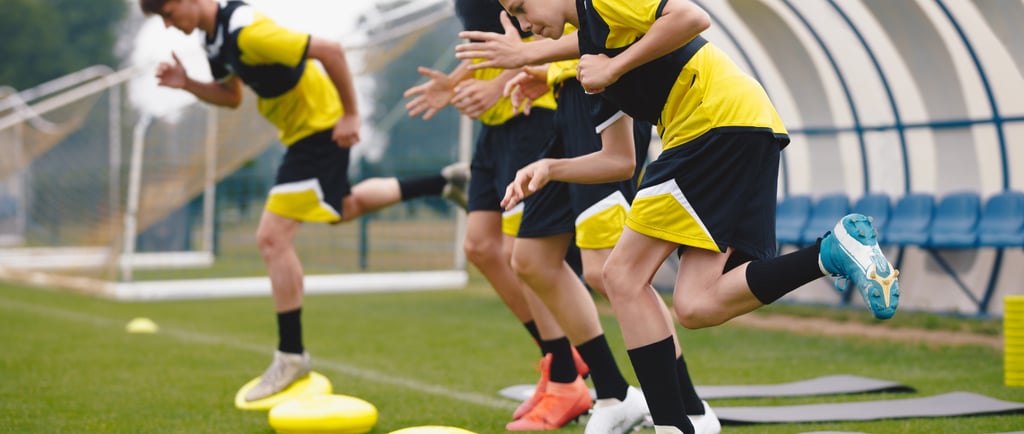Strategies for Evaluating Talent
Whether you're building a team of selected players or just wanting to know where players on your team stand, here's some insights to help.
4 min read


As a parent coach, one of your key responsibilities is evaluating the talent and skill levels of the young athletes on your team. This task is essential for designing effective practices, ensuring fair play, and helping each player reach their potential. Whether you’re an experienced coach or new to the role, having a set of strategies to assess talent can make a significant difference in your coaching effectiveness. This blog will explore various techniques and tips for evaluating talent, providing constructive feedback to players, and communicating effectively with their parents.
The Importance of Talent Evaluation
Talent evaluation in youth sports is crucial for several reasons:
Skill Development: Identifying each player’s strengths and areas for improvement helps tailor coaching to individual needs.
Team Balance: Understanding the skill levels of all players allows for better team composition and strategy planning.
Player Confidence: Providing players with clear insights into their abilities can boost their confidence and motivation.
Statistics and Insights
A study by the Positive Coaching Alliance found that athletes who receive balanced feedback—both positive reinforcement and constructive criticism—are more likely to stay engaged and motivated. Additionally, a report from the Youth Sports Research Council emphasizes the importance of parental involvement in a supportive role, noting that constructive feedback and positive reinforcement from both coaches and parents significantly contribute to a child’s enjoyment and long-term participation in sports
Techniques for Evaluating Talent
Observation During Play
One of the most effective ways to evaluate talent is through observation during regular play. Watch how players perform in both practice and game situations.
Key Skills to Observe: Focus on fundamental skills like dribbling, passing, shooting, and defending. Also, observe decision-making, positioning, and teamwork.
Game Situations: Assess how players handle pressure, make decisions, and execute skills during actual games.
Skill Drills and Tests
Incorporate specific drills and tests designed to assess different aspects of a player’s abilities.
Dribbling Drills: Use cone drills to evaluate control and agility.
Shooting Drills: Measure accuracy and technique with shooting drills.
Passing Drills: Assess precision and decision-making with passing drills.
Small-Sided Games
Small-sided games (e.g., 3v3 or 4v4) provide a more focused environment to observe individual skills and decision-making.
Increased Engagement: These games give players more touches on the ball and opportunities to showcase their skills.
Realistic Scenarios: They simulate real-game conditions, offering insights into how players might perform in actual matches.
Performance Metrics
Utilize performance metrics to objectively assess skills. Keep track of key statistics during practices and games.
Tracking Sheets: Use tracking sheets to record stats like goals, assists, successful passes, tackles, and interceptions.
Video Analysis: Recording games and practices for later analysis can provide detailed insights into a player’s performance.
Feedback from Assistant Coaches
Involve assistant coaches or parent volunteers in the evaluation process. They can provide additional perspectives and help ensure comprehensive assessments.
Collaborative Reviews: Hold regular meetings with your coaching team to discuss player evaluations and share observations.
Providing Constructive Feedback
Be Specific and Positive
When providing feedback, be specific about what the player did well and what they can improve. Always start with positive comments before addressing areas for improvement.
Sandwich Approach: Start with a positive comment, provide constructive criticism, and end with another positive comment. For example, “You did a great job with your dribbling today. Let’s work on your passing accuracy. I really like your effort and enthusiasm!”
Focus on Effort and Improvement
Emphasize the importance of effort and continuous improvement rather than just innate talent. This approach fosters a growth mindset.
Effort Recognition: Acknowledge hard work and persistence, even if the results aren’t perfect. This encourages players to keep trying and improving.
Set Achievable Goals
Help players set specific, achievable goals based on their evaluations. Goals should be SMART (Specific, Measurable, Achievable, Relevant, Time-bound).
Individual Goals: Work with each player to identify areas for improvement and set goals. For example, “Improve your dribbling speed by practicing for 15 minutes every day.”
Regular Check-Ins
Schedule regular check-ins with players to discuss their progress, review goals, and provide ongoing feedback.
Progress Meetings: Hold brief, informal meetings during practice to provide feedback and adjust goals as needed.
Communicating with Parents
Be Transparent and Open
Keep parents informed about their child’s progress and the evaluation process. Transparency builds trust and helps manage expectations.
Parent Meetings: Hold regular meetings or send updates to discuss player development and team progress.
Provide Constructive Feedback
When discussing their child’s performance, use the same approach you use with players—be positive, specific, and focus on effort and improvement.
Balanced Feedback: Highlight both strengths and areas for growth. For example, “Johnny has shown great improvement in his dribbling skills. We are working on his passing accuracy, and he’s making steady progress.”
Encourage Parental Support
Encourage parents to support their child’s development by focusing on effort and improvement rather than just outcomes.
Parent Involvement: Suggest ways parents can help at home, such as practicing specific skills or encouraging a positive attitude towards practice and games.
Conclusion
Evaluating talent in youth sports is a multifaceted process that involves careful observation, structured drills, and consistent feedback. As a parent coach, your ability to assess and develop your players’ skills is crucial for their growth and enjoyment of the sport. By employing these strategies, providing constructive feedback, and maintaining open communication with parents, you can create a positive and effective coaching environment. Remember, the ultimate goal is to foster a love for the game and help each player reach their full potential. With these techniques, you can ensure that your players not only develop their skills but also build confidence and a passion for sports.

